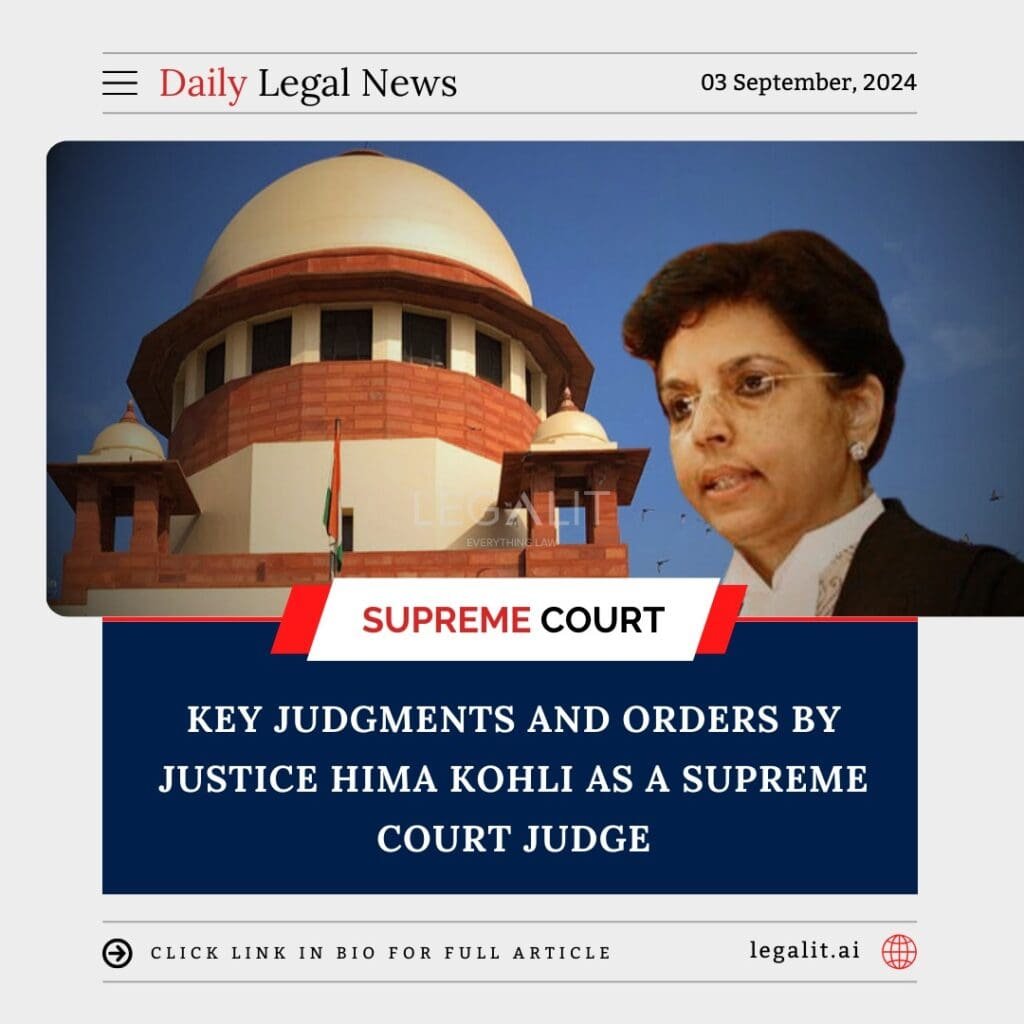
Justice Hima Kohli, appointed to the Supreme Court of India on August 31, 2021, has delivered several significant judgments and orders that have contributed to shaping Indian jurisprudence. Before her appointment to the Supreme Court, Justice Kohli served as the Chief Justice of the Telangana High Court and as a judge at the Delhi High Court. Her tenure on the Supreme Court bench has been marked by rulings that emphasize constitutional values, human rights, and procedural fairness. Below are some of the most important judgments and orders passed by Justice Hima Kohli:
1. Right to Fair Compensation and Transparency in Land Acquisition Case:
- Case: Indore Development Authority v. Manoharlal & Ors.
- Decision: Justice Kohli was part of a bench that dealt with the interpretation of Section 24(2) of the Right to Fair Compensation and Transparency in Land Acquisition, Rehabilitation, and Resettlement Act, 2013. The judgment clarified the legal position regarding lapses in land acquisition proceedings under the 2013 Act, providing significant relief to landowners whose lands had been acquired but not compensated or developed within a reasonable period.
- Significance: The ruling balanced the rights of the landowners against the need for urban development, emphasizing fairness in the compensation process and addressing ambiguities in the statutory framework.
2. Human Rights in Conflict Zones:
- Case: Extra Judicial Execution Victim Families Association (EEVFAM) & Anr. v. Union of India & Ors.
- Decision: Justice Kohli was involved in a landmark case addressing alleged extra-judicial killings in conflict areas like Manipur. The case called for a probe into instances of fake encounters and extrajudicial killings by the armed forces and police.
- Significance: Her participation highlighted the judiciary’s role in ensuring accountability and safeguarding human rights, even in conflict zones where security concerns often predominate.
3. Judgment on Protection of Fundamental Rights of Prisoners:
- Case: Rama Murthy v. State of Karnataka
- Decision: Justice Kohli passed orders ensuring the fundamental rights of prisoners, emphasizing their right to a dignified life and humane treatment, consistent with Article 21 of the Constitution. This case underscored the constitutional mandate that even those convicted or awaiting trial retain certain basic human rights.
- Significance: The judgment reinforced the importance of prison reforms and humane treatment of prisoners, reflecting a judicial commitment to uphold constitutional rights regardless of an individual’s circumstances.
4. Right to Privacy and Data Protection:
- Case: Justice K.S. Puttaswamy (Retd.) v. Union of India (Aadhaar Judgment Implementation Cases)
- Decision: In cases related to the Aadhaar scheme and its implementation, Justice Kohli upheld the principles laid down in the landmark privacy judgment (Justice K.S. Puttaswamy v. Union of India), ensuring that any use of Aadhaar data complies with privacy norms and statutory safeguards.
- Significance: The orders reinforced the balance between the state’s interest in implementing welfare schemes and protecting citizens’ privacy, supporting a data protection regime consistent with fundamental rights.
5. Gender Equality and Women’s Rights:
- Case: Sexual Harassment of Women at Workplace (Prevention, Prohibition, and Redressal) Act, 2013 Cases
- Decision: Justice Kohli has authored several rulings upholding the rights of women under the Sexual Harassment of Women at Workplace (Prevention, Prohibition, and Redressal) Act, 2013. She has underscored the importance of prompt and fair redressal mechanisms and the need to protect the dignity and safety of women in the workplace.
- Significance: These decisions have been pivotal in reinforcing legal protections for women and promoting gender equality in the workplace, ensuring that women’s rights are safeguarded in both public and private sectors.
6. Protection of Freedom of Speech:
- Case: Amish Devgan v. Union of India & Ors.
- Decision: In this case, Justice Kohli upheld the importance of balancing freedom of speech with the need to prevent hate speech and incitement to violence. She emphasized that while freedom of expression is a fundamental right, it is not absolute and must be exercised responsibly.
- Significance: The judgment clarified the boundaries between protected speech and hate speech, contributing to the ongoing debate on freedom of expression in India.
7. Environmental Protection:
- Case: M.C. Mehta v. Union of India & Ors. (Air Pollution Cases)
- Decision: Justice Kohli has been part of benches addressing environmental protection and air pollution in Delhi and the National Capital Region (NCR). She has advocated for stringent measures to curb air pollution and protect public health.
- Significance: The orders have reinforced judicial commitment to environmental conservation and highlighted the need for robust governmental action to address air quality issues and safeguard citizens’ right to a healthy environment.
8. Judgment on Election Law:
- Case: Rajbala v. State of Haryana
- Decision: Justice Kohli contributed to rulings concerning election law and voter rights, examining the constitutional validity of restrictions on the right to contest elections. Her judgments have explored the balance between state policy objectives and the democratic rights of citizens.
- Significance: These rulings have addressed critical issues related to the electoral process, such as eligibility criteria, transparency, and fairness in elections, reinforcing democratic principles.
Conclusion:
Justice Hima Kohli’s contributions as a Supreme Court judge reflect her focus on upholding constitutional principles, protecting fundamental rights, ensuring fairness in judicial processes, and promoting justice for marginalized groups. Her judgments and orders have had a broad impact across various areas of law, including human rights, gender equality, environmental protection, and privacy rights.